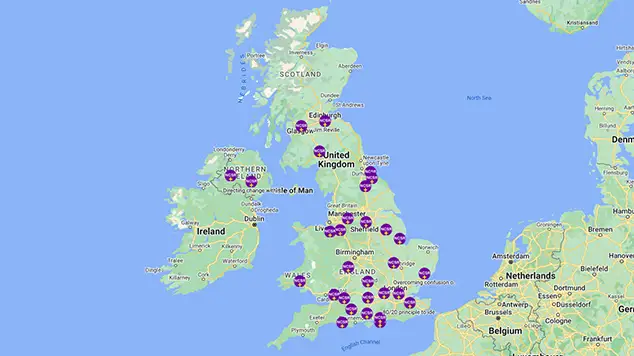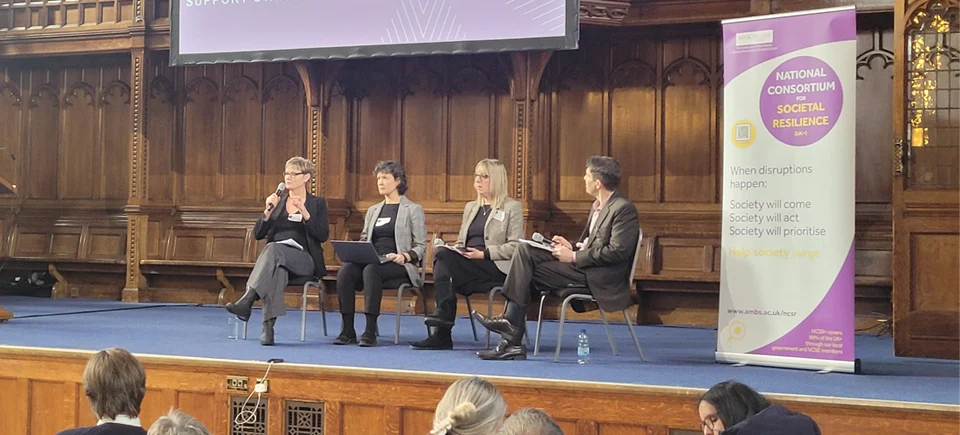National Consortium for Societal Resilience [UK+]
Working to build resilience in local communities and throughout society.
![National Consortium for Societal Resilience [UK+] logo](/media/ambs/content-assets/images/logos/ncsr-logo-250x140.webp)
National Consortium for Societal Resilience [UK+]
The National Consortium for Societal Resilience [UK+] (NCSR+) was established 'to enhance the UK[+] whole-of-society approach to resilience, so that individuals, groups, organisations, and networks can all play a meaningful part in building the resilience of our society'.
The consortium is co-chaired by Alliance Manchester Business School, Suffolk Resilience Forum and Sussex Resilience Forum. Membership of the consortium includes almost all local authorities in the UK, along with key resilience partners.
Contact us at ncsr@manchester.ac.uk.
About the NCSR+
The NCSR+ involves 63 organisations that are central to building resilience in the UK[+]. These organisations represent both resilience partnerships, sector partners and communities across the UK.
Resilience partnerships
These are the multi-agency collaborations that address local risk, vulnerability, and preparedness for disruptive events. Resilience partnerships in the NCSR+ include:
- 37 of England's 38 Local Resilience Forums
- 3 of Northern Ireland's 3 Emergency Preparedness Groups
- 3 of Scotland's 3 Regional Resilience Partnerships
- 3 of Wales' 4 Local Resilience Forums
Governments from the Crown Dependencies of Guernsey, Jersey, and the Isle of Man, which, along with others, contribute as the '+' in NCSR+.
Sector partners
These are the organisations that have strong local connections and can amplify the voice of their constituencies. Sector partners in the NCSR+ include:
- Business sector - including larger organisations (BiTC), small businesses (Federation of Small Businesses)
- Voluntary sector - including collections of national charities (VCSEP), large charities (British Red Cross), hyper-local voluntary organisations (NAVCA, Salford CVS, Cumbria CVS)
- Government sector - including Environment Agency, whole-system national perspectives (Northern Ireland Executive, Scottish Government, Welsh Government), local government capabilities that are not normally in the space of resilience to disruptive events (Local Government Association)
- Academic sector - to support evidence-led practice through The University of Manchester providing theory, research skills, and thought leadership to underpin local action.
Community
These are individuals, neighbourhoods, businesses, and organisations that share a characteristic such as being co-located.
The voice of local communities is initially represented through the relationships that resilience partnerships and sector partners have with their communities, but this will deepen as the consortium matures.
The NCSR+ members work with local communities to:
- Reduce risks at the source
- Understand changes in vulnerabilities
- Enhance levels of preparedness for emergencies.
Planning for these activities needs strong collaboration because disruptive events affect people differently and cross local boundaries. Relationships are key.
We collaborate with local communities of all shapes, sizes, and cohesiveness with the view that every individual, community group, business, and organisation can benefit from becoming more resilient.
Society is a broad spectrum, and one single definition of societal resilience will not satisfy all actors. This is because different parties will want to accentuate the aspects that they prioritise and attenuate those that sit elsewhere.
For local resilience partnerships and sector partners who represent a wide landscape, the NCSR+ defines societal resilience as: 'Capability created by local systems that helps people and places to adapt and advance in a changing environment'.
Why we chose our definition
Our definition is intended to be flexible - it can be altered for different audiences by changing the type of language in the definition and the concepts to align to the context.
For example, local community groups may not connect with the NCSR+ definition because it does not speak in their language to their priorities.
Community-focused
Reflecting on this, The University of Manchester created an intuitive, community-focused definition of societal resilience which can be used when communicating with community groups.
This definition of societal resilience is: 'capabilities created before, during, and after a disruption that involves everyone who wishes to support those who are in need'. This community-focused definition amplifies those aspects that community groups may have an interest in. It doesn't seek to cover the widest landscape in the way that the NCSR+ definition does to our partners.
There is a lot of substance behind the words used in these definitions - too much detail to add to the definitions themselves. We define each of the terms in bold on pages 2-3 of an article in The Manchester Briefing (PDF).
Local government and voluntary organisations have long been discussing how to renew their efforts on community resilience. This includes how to build a cohesive, risk-aware, and prepared society that works with partners to enhance local resilience.
This ambition was written into the UK Government Resilience Framework which outlined new intentions on whole-of-society resilience.
To operationalise these national intentions into local systems, the NCSR+ will actively listen to governments to understand their direction on societal resilience. This requires research to understand how to operationalise policy, beginning with the components and enablers of good practice. It also includes:
- Building new partnerships
- Listening to communities
- Co-producing resilience
- Facilitating grassroots activity
- Enhancing skills in resilience partnerships and sector partners.

Duncan Shaw - Operational Research and Critical Systems
Duncan works in Operational Research and Critical Systems (Alliance Manchester Business School) at the University of Manchester. He works in the Humanitarian and Conflict Response Institute focusing on developing frameworks to support decision making in emergency planning, response and recovery. He has a particular interest in developing good governance around involving volunteers and community groups in the response to emergencies and in supporting community recovery to major disruptive events.
Duncan sits on numerous research, policy, planning and evaluation committees for the European Union, United Nations, international NGOs and networks, and governments across the world. He chairs a committee on Community Resilience for the International Standards Organization and wrote disaster-related international standards on spontaneous volunteers (ISO22319), conducting peer reviews (ISO22392), mass evacuation (ISO22315), and vulnerable people (ISO22395).
On COVID-19, he contributes to several local and national committees on response and recovery, working in the UK and with governments in many countries as they address the consequences of the virus. He is currently writing the international standard on recovery and renewal from pandemics (ISO22393).

Becky Heginbotham-Blount - Suffolk LRF
Becky works with the Suffolk Resilience Forum as the Partnership Manager coordinating governance, partnership work and managing the secretariat team reporting to the SRF Chair. Becky started her career in the public sector in 2005 working for Norfolk Fire and Rescue Service in the emergency control room, specialising in National Resilience and emergency plans, finishing as Watch Manager Control in 2016.
She moved across to Norfolk and Suffolk Constabularies working as an Emergency Planning Officer specialising in offshore responses working with UK Police Energy Offshore Group, as well as other emergency planning work streams and military liaison.
Becky started the role as SRF Partnership Manger in 2020, just before EU Transition during Covid-19, restarting the business-as-usual work streams, driving the partnership forward working with the LRF Fund increasing capability and capacity. She has an interest in learning from Lessons Identified (LI's) during incidents and exercises, societal resilience, and sharing best practice nationally and globally.

Chris Scott - Assistant Manager for West Sussex County Councils' Resilience and Emergencies Team
Chris is the Assistant Manager for West Sussex County Councils' Resilience and Emergencies Team. He also Co-Chairs the Sussex Resilience Forums' Sussex Community Resilience Partnership, which is the working group linking Cat 1 Responders with the Voluntary Sector. Chris also sits on the Response and Delivery Groups for the Sussex Resilience Forum.
After college he joined Cleveland Constabulary as a police officer. After a couple of years, he specialised in Command and Control and in Major Incident communications. He later joined West Sussex Fire and Rescue in their Command & Mobilising Centre and was a Mobilising Officer before his transfer to the Resilience and Emergencies Team in 2015.
Advisory Board
- Becky Heginbotham-Blount (Suffolk LRF)
- Chris Scott (West Sussex Council)
- Carney Bonner (Great Western Railway)
- Joan McCaffrey (NI Local Government Civil Contingencies)
- Sarah Whatley (South Yorkshire LRF)
- Duncan Shaw (The University of Manchester).
NCSR+ partners
Members of the NCSR+ represent more than 97% of the UK population through the local governments that serve them and their sector partners.
- Navca
- Salford CVS
- Cumbria CVS
- The University of Manchester
- Business in the Community
- British Red Cross
- VCS Emergencies Partnership
- Environment Agency
- Local Government Association
- The Federation of Small Businesses
- Great Western Railway.
- Cumbria
- Greater Manchester
- Lancashire
- Merseyside
- Humber
- North Yorkshire
- South Yorkshire
- West Yorkshire
- Cleveland
- Durham and Darlington
- Northumbria
- Staffordshire
- Warwickshire
- West Mercia
- West Midlands
- Derby and Derbyshire
- Leicestershire
- Lincolnshire
- Northamptonshire
- Nottingham and Nottinghamshire
- Bedfordshire and Luton
- Cambridgeshire and Peterborough
- Essex
- Norfolk
- Suffolk
- Avon and Somerset
- Dorset
- Devon, Cornwall and Isles of Scilly
- Gloucestershire
- Wiltshire and Swindon
- Hampshire and Isle of Wight
- Kent
- Surrey
- Sussex
- Thames Valley
- London
- Cheshire Resilience Forum.
- Belfast Emergency Preparedness Group
- Northern Emergency Preparedness Group
- Southern Emergency Preparedness Group
- Northern Ireland Executive.
- West of Scotland RRP
- North of Scotland RRP
- Scottish Government
- East of Scotland RRP.
- Dyfed-Powys LRF
- Gwent LRF
- Welsh Government
- North Wales LRF.
- Guernsey
- Jersey
- Isle of Man Government.
News, events and podcast
Every year, we organise a national conference to bring together partners from policy and practice across the UK to share insights and collaborate.
Watch some of the attendees' highlights from the 2025 conference below:
Our fourth National Conference on Societal Resilience will take place over two days on 24 and 25 February 2026.
Our team run a series of webinars held jointly with the Resilience Beyond Observed Capabilities Network+ (RBOC+) project. The webinars are designed for resilience practitioners, resilience partnerships and partner organisations to share insights and lessons on developing societal resilience that others may find useful.
Our latest webinar, explores the amazing work that these community groups have done to support their places to become more resilient to a flood. You can watch the webinar below.
You can also watch all societal resilience webinars in the series.
The NCSR+ podcast features conversations with influencers and leaders shaping societal resilience to disruption in the UK and internationally. Guests share their thinking on societal resilience and what drives them.
In our first podcast we're joined by Alex Wood-Davis from Cambridgeshire Local Resilience Forum. Alex talks about what led her into local resilience and her observations on what works and how to support communities.
Listen to the podcast below.
We publish regular e-updates on NCSR+ news and events. To sign up, email listserv@LISTSERV.MANCHESTER.AC.UK. In the body of the email include 'SUBSCRIBE NCSR-Events [Your name and organisation].
Example
SUBSCRIBE NCSR-Events Bill Taylor Manchester University.
Our impact
The influence of the NCSR+ on how resilience partnerships and partners think about and implement the building of a resilient society across the UK+, can be explored via the impact cases indicated on the map we've created.
View the interactive NCSR+ Impact Cases map (Google Maps).

We previously published a fortnightly document called 'The Manchester Briefing on COVID-19'. The document acted as a database aimed at those who were planning for and implementing recovery and renewal from COVID-19, including government emergency planners and resilience officers.
In the database, we brought together international lessons and examples which prompted thinking on recovery and renewal, as well as other information from a range of sources. Many of these lessons are still relevant, including for developing preparedness for future pandemics.
The Manchester Briefing on COVID-19: Database of international lessons for Recovery and Renewal.
The NCSR+ is an Affiliate of the United Kingdom Resilience Academy (UKRA) and has signed a Memorandum of Understanding with the UKRA to strengthen relations and develop cooperation in areas of mutual interest relating to national resilience.
The NCSR+ also has strategic relationships and affiliations with:
- The British Standards Institution
- International Organization for Standardization
- United Nations Office for Disaster Risk Reduction – Sendai Framework Voluntary Commitments
- Global Network of Civil Society Organisations for Disaster Reduction
- Resilience Beyond Observed Capabilities Network Plus
- Emergency Planning Society.
Publications about societal resilience
The National Briefing on Societal Resilience [UK+] has developed from The Manchester Briefing on COVID-19 and is produced by Alliance Manchester Business School.
You can read all briefings from The National Briefing on Societal Resilience [UK+].
We've compiled a list of recommended journal articles to read about societal resilience.
- Legitimacy and place leadership: Responding to and recovering from disruption in regional soft spaces (2024)
- The role of essential businesses in whole-of-society resilience to disruption (2024)
- Resilience to disruptions: The role of regional soft spaces (2024)
- Sustaining spontaneous volunteer groups following their response to a disaster (2024)
- Configuring systems to be viable in a crisis: The role of intuitive decision-making (2024)
- The foundations of influencing policy and practice: How risk science discourse shaped government action during COVID-19 (2023)
- Disaster reparations? Rethinking disaster recovery through the politics of affect (2023)
- Recovery for development: A multi-dimensional, practice-oriented framework for transformative change post-disaster (2023)
- People in a pandemic: Rethinking the role of ‘Community’ in community resilience practices (2022)
- Post-COVID recovery and renewal through whole-of-society resilience in cities (2022)
- A behavioural simulation study of allocating evacuees to public emergency shelters (2021)
- A structured methodology to peer review disaster risk reduction activities: The Viable System Review (2020)
- Recovering from COVID-19: The key issues (2020)
- Peer Reviews for Making Cities Resilient: A Systematic Literature Review (2019).
You can read guidance on how to develop recovery plans and renewal strategies from a major emergency, disaster or crisis in the ISO/TS 22393 - Guidelines for planning recovery and renewal (2021).
You can read about how to use the ISO/TS 22393 guidelines in our article 'Operationalising ISO 22393: Seven steps to plan recovery and renewal' (PDF).
We also have guidance on self-evaluation in our article 'Guidance for self-reflection on Recovery and Renewal' (PDF).
Practitioner-focused articles and reports
- A strategy for local government to deliver whole of society resilience (Emergency Services Times, 2023)
- Operationalising Societal Resilience as a Local Resilience Capability (NPC, 2023)
- International Models of Emergency Management Involving Civil Society (NPC, 2023)
- Communicating Effectively with the Public During a Crisis (NPC, 2022)
- Societal resilience initiatives during COVID-19 (NPC, 2022)
- Risky business: Look local to learn lessons from the COVID-19 crisis (LocalGov, 2022)
- Renewal of Community Resilience: A new local and national resilience capability? (NPC, 2021)
- What role can communities play in supporting resilience to climate emergencies? (AMBS, 2021)
- Recovering from COVID-19: Community Resilience (BSi, 2021)
- Renewal of volunteering (PDF) (VCSEP, 2021, p.34)
- Community resilience: A new capability for local resilience (LocalGov, 2021)
- Communities as a local asset for resilience (AMBS, 2021)
- Contact tracing apps: Considerations for local authorities (LocalGov, 2020).
Written and oral evidence, House of Lords
- Risk Assessment and Risk Planning Select Committee, focusing on how the public can be mobilised as a resource to support national resilience (2021)
- Benefits of increasing public involvement in emergency planning and the role of exercising to test risk preparedness, and addresses lessons learnt from COVID-19 for approaches to risk planning and risk assessment (PDF) (2021)
- Written evidence on challenges faced by the UK in preparation for a pandemic, including logistics, guidance and funding (PDF) (2020).
Publications where the work of NCSR+ team is cited
- Flames of change: Innovating heat and wildfire governance for inclusive communities (UNDRR, 2024)
- United Nations Sendai Framework Voluntary Commitments synthesis and analysis report (UNDRR, 2022)
- House of Lords UK Resilience Report (2021)
- UK Parliament - Preparing for Extreme Risks: Building a Resilient Society (PDF)(2021, Mobilising the public: p.59: 176)
Global outreach
- UNDRR Sendai Framework Voluntary Commitment - to support members of the National Consortium for Societal Resilience [UK+] to design and implement a nationally-consistent strategy for societal resilience
- Making Cities Resilient 2030 (MCR2030) Participating Entity.

Fourth National Conference on Societal Resilience
Attend our in-person conference on 24-25 February 2026.